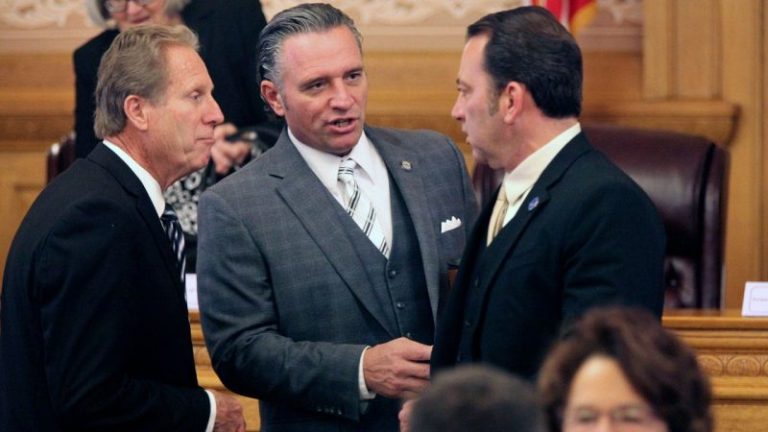Democratic Gov. Laura Kelly and the Republican-controlled Kansas Legislature are headed toward big fights over spending on special education programs, pay raises for government workers and how much the cash-flush state should sock away for worse economic times.
Kelly released budget proposals Thursday that include depositing $500 million into the state’s rainy day fund, giving state workers a 5% pay increase across the board and phasing in a 61% increase in spending on programs in K-12 public schools for children with special needs.
Top Republican lawmakers want Kansas to set aside at least $1 billion of its current surplus as a hedge against future budget shortfalls. The GOP chairs of the House and Senate budget committees had strong misgivings Thursday about giving an across-the-board pay raise to state workers, and the chair of a House committee on education spending questioned whether the extra money for special education is necessary.
The governor’s budget director, Adam Proffitt, told the House and Senate budget committees that Kelly is ‘looking across the horizon’ to ensure that both tax cuts and government programs can be sustained into the future. Kansas endured persistent budget shortfalls during a 2012-2017 Republican experiment in slashing income taxes.
‘We’re building a better Kansas for working families and retirees — all while maintaining a balanced budget,’ Kelly said in a statement.
Kelly, who won a second term in November, already was headed toward a clash with Republican legislators over how best to cut taxes. The state is projecting $3.2 billion in surplus cash in its treasury at the end of June 2024 and nearly $1 billion more already in the rainy day fund. The Legislature is set to remain in session until early May.
Kelly’s biggest tax proposal is eliminating the state’s 4% sales tax on groceries, while GOP leaders want to create a ‘flat’ income tax, rather than having multiple tax brackets for filers.
Putting a larger amount of the current projected surplus into the rainy day fund for future use limits lawmakers’ options for tax cuts or new spending.
Kelly proposed a $24.1 billion spending blueprint for state government for the 2024 budget year, which begins July 1. That’s $1.2 billion, or 5.3%, more than the current $22.9 billion budget approved by lawmakers last year.
Proffitt expressed confidence that the state’s revenue projections will hold up through June 2024. Inflation has eased over the past six months from decades-high levels, but the head of the Legislature’s research staff, J.G. Scott, told the budget committees Thursday that eventually, it and the U.S. Federal Reserve’s increases in interest rates to contain it will cause ‘a lot of cooling in the economy.’
‘We keep hearing the word ‘uncertainty,’’ said Democratic state Sen. Jeff Pittman, of Leavenworth.
Proffitt argued that setting aside another $500 million — to build the rainy day fund up to a total of $1.5 billion — would be enough to cover even the worst year’s decline in revenues.
But several Republicans said they want the state to have $2 billion on hand, enough to plug $1 billion a year into the budget for two years. Senate President Ty Masterson, an Andover Republican, told reporters this week that he wants Kansas ready for economic problems as bad as or worse than those of the Great Recession of 2007-08.
‘I don’t want us to take that hit like we did last time,’ Masterson said.
Kelly’s proposed pay increases for government workers would help short-staffed agencies recruit and retain employees, Proffitt said. But Republicans said they want to concentrate first on boosting the pay of workers whose salaries are at least 5% below those of people holding similar jobs with private companies.
Meanwhile, educators are focusing on boosting spending on special education programs after years of increases in the state’s general aid to local school districts. Kansas law sets a target of having the state cover 92% of the additional costs tied to special education, but the current spending of $546 million covers only 76%.
With special education costs typically rising each year, Kelly’s plan would boost the state’s spending by $336 million over five years, bringing it to $882 million for the 2028 budget year.
But state Rep. Kristey Williams, an Augusta Republican who chairs the House’s committee on K-12 spending, has repeatedly questioned how the state calculates excess special education costs and the dollars available to cover them.
And she said Thursday, ‘Money’s not always the answer to every problem.’

